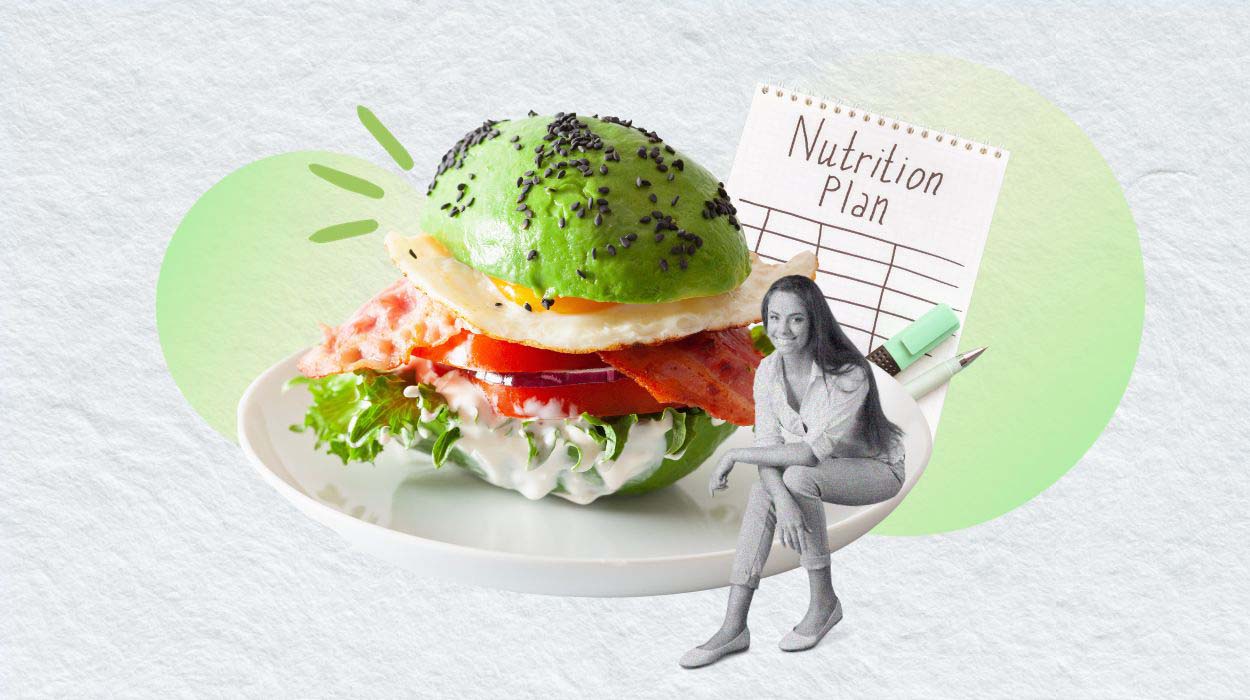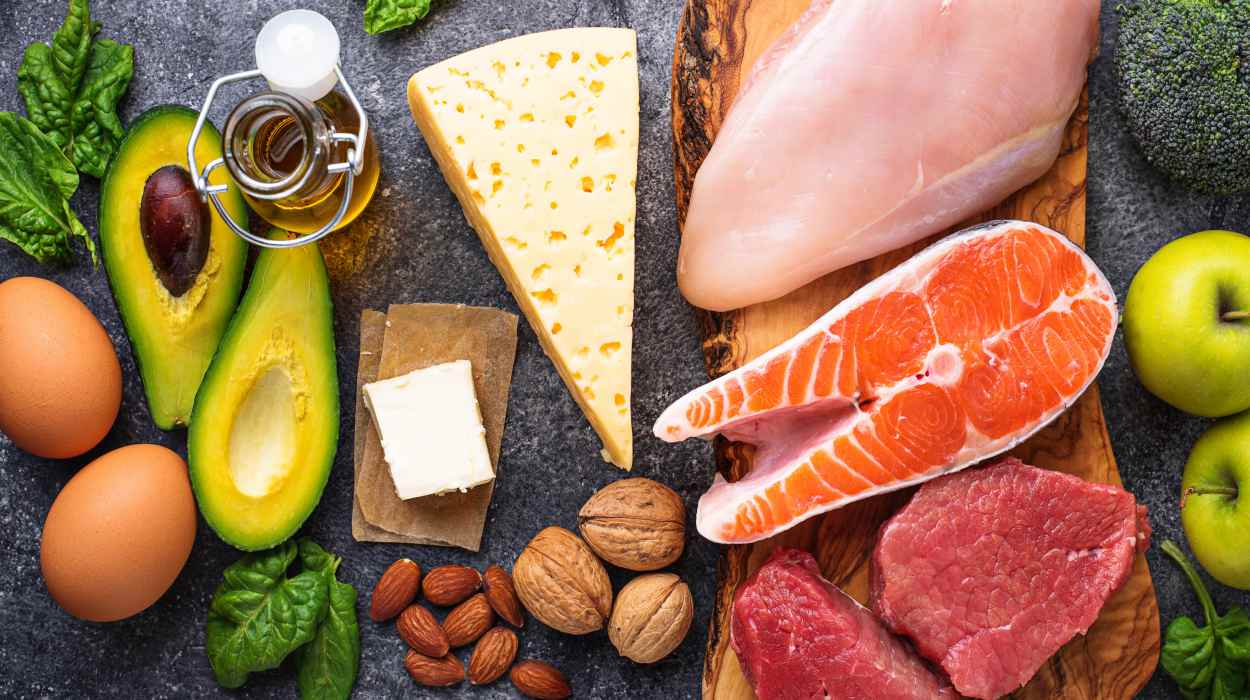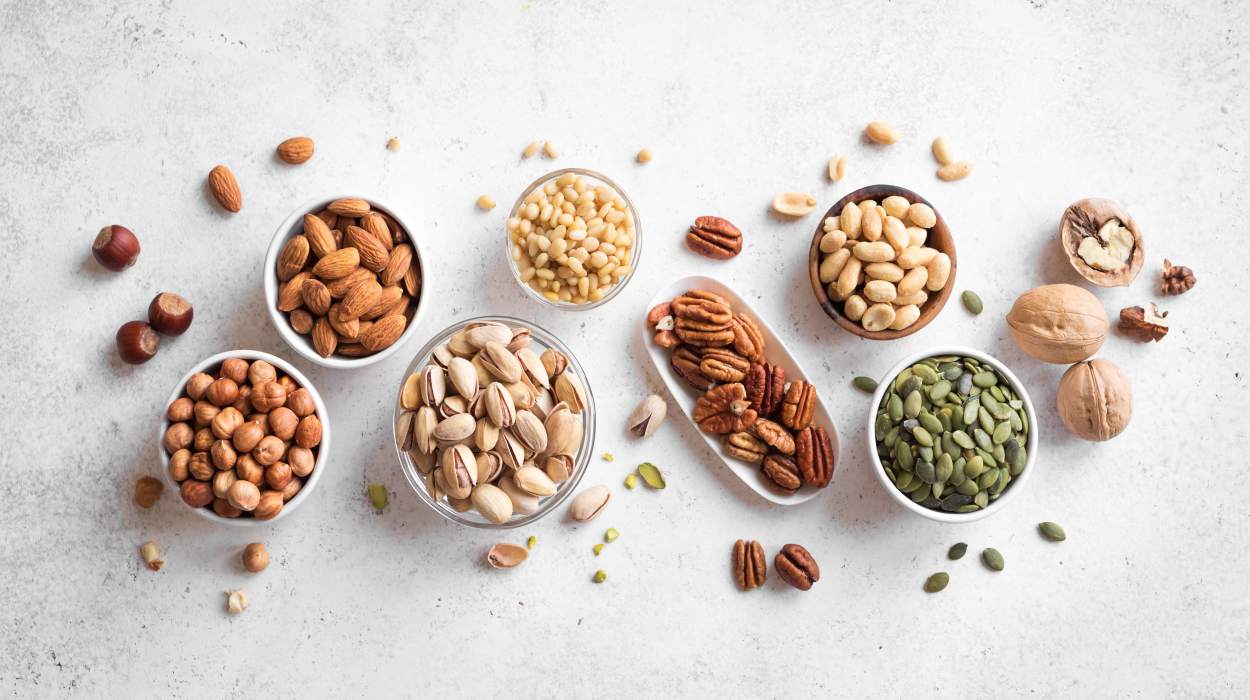 Expert's opinion
Expert's opinion
Expert's opinion
The article is a subjective view on this topic written by writers specializing in medical writing.
It may reflect on a personal journey surrounding struggles with an illness or medical condition, involve product comparisons, diet considerations, or other health-related opinions.
Although the view is entirely that of the writer, it is based on academic experiences and scientific research they have conducted; it is fact-checked by a team of degreed medical experts, and validated by sources attached to the article.
The numbers in parenthesis (1,2,3) will take you to clickable links to related scientific papers.
Lazy Keto Diet 2024: What Is It, Benefits & Meal Plan Examples

The lazy keto diet is a slightly different, more relaxed version of the standard keto diet – a diet high in fat, yet low in carbs. Eating a lazy keto may be a more desirable choice for those who are looking to follow a keto diet, but who are unable to adhere to strict macro counting. Furthermore, the lazy keto diet (unlike the “dirty” keto diet) emphasizes whole, unprocessed foods within the high fat/low carb framework. This keto method allows you to enjoy the benefits of almonds, the benefits of walnuts, and other healthy foods while still meeting your keto health goals. And for additional support, consider adding in the best multivitamin for a keto diet.
Key Takeaways
- A lazy keto diet requires that only carb intake is monitored, keeping it at 10% or less, while fat and protein don’t need to be tracked.
- The keto diet has many benefits such as promoting fat loss, being less restrictive, etc…
- Any strict keto diet can have some disadvantages including possible weight gain, compromised gut microbiome, etc…
What Is A Lazy Keto Diet For Weight Loss?
To understand what a “lazy” keto diet is, we must understand the standard keto diet. A standard ketogenic diet follows strict macro ratios – very low carbohydrates (10%), moderate protein (20%), and lots of fat (70%). These percentages can be adjusted slightly, but overall, carbs are low and fats are high[1]. A “lazy” keto diet requires that only carb intake is monitored, keeping it at 10% or less, while fat and protein don’t need to be tracked.

Benefits Of The Lazy Keto Diet
Promotes Fat Loss
Like the standard keto diet, lazy keto meals still promote fat loss. On the traditional keto diet, body weight can be reduced[2], especially in the first six months of following the diet. This has other promising implications for reducing cholesterol and the risk of diabetes[3].
Less Restrictive
A lazy keto meal plan allows some of the strictness of a standard keto diet to be removed. Instead of counting all macros, dieters are encouraged to just keep their low carbs (about 10% of daily calories), but not pay as much attention to their fats and protein.
Healthy
A lazy keto benefits refers to being more lax around calorie counting the macros, but not lax about the sources of calories. This type of diet emphasizes that all food in the diet should be whole and unprocessed so that while you keep carbs low and fats high, you’re choosing high-quality, healthy foods (such as nuts, seeds, and avocado for fat, and organic, lean meat for protein).
Sustainable Diet
Because the lazy ketogenic diet is both less restrictive and more healthy, it lends itself to being more sustainable, or easy to stick to. Unlike other fad diets which can cause people to give up and less of a risk of abandoning the diet before the health benefits have been achieved.
May Treat Epilepsy
The keto diet has long been used to treat epilepsy[4] in children, a neurological condition in which the patient has repeated seizures. Lazy keto diets can help achieve similar benefits, however, one should not attempt to follow a keto diet (or any diet, for that matter) on their own to treat a serious medical condition. Rather, any therapeutic diet should be tried under the supervision of a qualified health practitioner.
Lazy Keto Diet Vs. Dirty Keto
Both the “lazy” keto diet and the “dirty” keto diet are variations of the standard ketogenic diet, however, there is an important distinction between these two sub-versions.
Lazy keto diets, weight loss while reducing carbs, emphasize real, whole, unprocessed food for the bulk of the diet (fats and protein), as well as for the minimal carbs. This means that the diet follower shouldn’t get their protein and fat from just any source (such as fried, processed foods), but from healthy sources, specifically: lean, organic meat, coconut oil, olive oil, nuts, seeds, and avocado. In other words, food quality matters.
By contrast, a dirty keto diet does not specify where the macro food sources come from, and may even encourage diet followers to choose unhealthy sources of protein and fat (such as fast foods, processed meat, and fried foods). Dirty keto cares only about the macros and calorie delineation, not about the quality of the food to lose weight.
Foods To Eat On The Lazy Keto Diet

Eating a keto diet type lazy doesn’t mean you have to sacrifice health or taste. Here are foods to include on a traditional ketogenic diet:
- Nuts: walnuts, almonds, pistachios, pine nuts, Brazil nuts, cashews, etc.
- Seeds: sesame, sunflower, flax, chia, pumpkin, etc.
- Healthy fats: coconut oil, flaxseed oil, olive oil, avocados, and avocado oil, fatty fish like salmon, mackerel, and sardines
- Low-carb foods veggies: leafy greens, asparagus, broccoli, cauliflower, string beans, zucchini, etc.
- Herbs and spices
- Protein: meat, fish, poultry
- Low-sugar or naturally sweet desserts such as dark chocolate
Foods To Avoid On The Lazy Keto Diet

A lazy keto diet restricts or reduces carbohydrates (carbs should make up roughly 10% of daily calories). Here are some carbohydrates to avoid or reduce while on:
- High-sugar fruits such as bananas, peaches, pineapple, etc.
- Dried fruit (dried fruit contains even more sugar than whole, fresh fruit)
- Sugar, including added sugar in baked goods and condiments, as well as natural forms of sugar, such as fruits
- Sweeteners such as honey, agave, fructose, rice syrup, maple syrup, etc.
- Grains such as oats, rice, buckwheat, and quinoa
- Starches such as white potatoes, sweet potatoes, squash, and bread
- Beans such as lentils, white beans, navy beans, chickpeas, black beans, kidney beans, etc. (though beans are a good source of protein, they are also high in carbs)
Example Of A Lazy Keto Diet Meal Plan
Wondering what a typical day of eating a lazy keto looks like? Try this:
- Breakfast: Eggs with smoked salmon, sliced avocado, sauteed mixed vegetables in coconut oil, and a small piece of whole grain toast with grass-fed butter or ghee
- Lunch: Grilled chicken salad with veggies, nuts, and avocado, dressed in olive oil
- Dinner: Sardines or grass-fed steak, roasted broccoli and cauliflower with sauteed spinach, and fried egg
- Snack: Handful of nuts and seeds with sliced apple and cottage cheese and two squares of dark chocolate
- Drink: Unsweetened nut milk, tea, bulletproof coffee, filtered water with lemon
Tips For A Lazy Keto Diet
Starting any new diet can be daunting and takes some getting used to. Here are a few key tips that can help you adjust and stick to a lazy keto diet:
- Take advantage of not having to track all your macronutrients. Really let go. Just focus on keeping your carbs low. Otherwise, don’t give your other macronutrients a second thought.
- Use a calculator or other tracking app to keep tabs on your carbs. Whatever helps you streamline the process.
- Don’t change anything else about your eating routine – eat only when you feel hungry, stop when you’re full, don’t skip meals (unless you’re really not hungry), and keep your blood sugar steady.
- Focus on food quality, not just carbs, fats, and protein. This is the main difference between “lazy” and “dirty” keto. All your food sources, whether fat, protein, or carbs, should come from whole, clean, unprocessed foods.
- Be prepared to feel a little uncomfortable. Any time you start a new diet, you may feel different, or experience some flu-like symptoms (especially when you drastically reduce carbs). This is the body having a sort of detox reaction. It should eventually get easier, but if things don’t get better, listen to your body and increase carbs as needed.
Disadvantages Of A Lazy Keto Diet
Because the lazy keto diet is slightly more relaxed, it may not pose as many benefits as a standard keto diet. Additionally, any strict keto diet can have some disadvantages.
- Not likely to cause ketosis – ketosis[5] is when your body burns fat for energy rather than carbs. On a keto diet, if you’re only tracking your carb intake (and not paying attention to fat), you may not enter ketosis.
- Other essential nutrients may be missed – any time you restrict carbs (or any specific food group), you’re missing out on the nutrients those foods offer. Although eating a low-carb diet has its benefits, many unprocessed carbs, such as whole grains, have essential vitamins and nutrients. You may need to have your labs done regularly with a doctor to ensure you’re getting adequate nutrition.
- Possible weight gain – Aside from limiting calories from carbs, there are no other restrictions on a lazy keto, which means a person can overdo it on fat and protein. This can lead to weight gain. Even more so if the ongoing restrictions lead to binging later on.
- Compromised gut microbiome – We need a diverse plant diet (which provides fiber) to feed our beneficial gut bacteria or our gut microbiome. This is what helps improve digestion, immunity, heart health, and brain health, and reduce the risk for various diseases. These plant foods that contain fiber also naturally contain carbs. While you can get some fiber from non-starchy vegetables, there’s much more to be had in fruits, beans, and whole grains – all the foods that need to be avoided on a keto diet.
Conclusion
The lazy keto diet is a more user-friendly version of the ketogenic diet for weight loss. As opposed to tracking all your macros (carbs, protein, and fat), the traditional keto diet only encourages tracking carbs, keeping them to 10% or less of your diet. Additionally, unlike the “dirty” keto diet, which doesn’t specify where your food sources come from, the lazy ketogenic diet emphasizes real, whole foods. This can be a great option for those who want to explore keto but who are daunted by the strict rules around the diet. dietitian if you experience any side effects or have any concerns.
+ 5 sources
Health Canal avoids using tertiary references. We have strict sourcing guidelines and rely on peer-reviewed studies, academic researches from medical associations and institutions. To ensure the accuracy of articles in Health Canal, you can read more about the editorial process here
- O’Neill, B. and Raggi, P. (2020). The ketogenic diet: Pros and cons. Atherosclerosis, [online] 292, pp.119–126. doi:https://doi.org/10.1016/j.atherosclerosis.2019.11.021.
- Rafiullah, M., Musambil, M. and David, S.K. (2021). Effect of a very low-carbohydrate ketogenic diet vs recommended diets in patients with type 2 diabetes: a meta-analysis. Nutrition Reviews, [online] 80(3), pp.488–502. doi:https://doi.org/10.1093/nutrit/nuab040.
- Kumar, S., Behl, T., Sachdeva, M., Sehgal, A., Kumari, S., Kumar, A., Kaur, G., Yadav, H.N. and Bungau, S. (2021). Implicating the effect of ketogenic diet as a preventive measure to obesity and diabetes mellitus. Life Sciences, [online] 264, p.118661. doi:https://doi.org/10.1016/j.lfs.2020.118661.
- Schoeler, N.E. and Cross, J.H. (2020). Ketogenic diet therapy in infants with epilepsy. Paediatrics and Child Health, [online] 30(10), pp.356–360. doi:https://doi.org/10.1016/j.paed.2020.07.004.
- Sumithran, P. and Proietto, J. (2008). Ketogenic diets for weight loss: A review of their principles, safety and efficacy. Obesity Research & Clinical Practice, [online] 2(1), pp.1–13. doi:https://doi.org/10.1016/j.orcp.2007.11.003.



